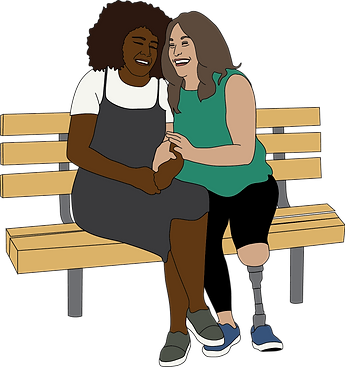FOCUS COMMUNITIES

The Blue Mountains Women’s Health & Resource Centre is funded to provide health services to meet the needs of these focus communities:
• Aboriginal (First Nations) women
• Culturally and linguistically diverse (CALD) women
• Lesbian, bisexual, transgender, intersex, non-binary and queer (plus)
• Women living with disability
• Women experiencing socio economic disadvantage or homelessness
• Women Carers
• Women living in Lithgow (rural or regional communities)
Women in these communities are more likely to experience significant disadvantage in accessing health services, and in their experience of health care and health outcomes.
For this reason, our Women’s Health Clinic provides tailored healthcare, supporting vulnerable women with their physical and mental health, and sexual and reproductive health.
Women from these focus communities who are experiencing chronic pain are prioritised and eligible for our Massage Therapy service.
Our Counselling program also prioritises women who are within our focus population as they are recognised as experiencing disadvantaged in accessed support services in within the ‘mainstream’ community and health.
Our approach to meeting the needs of these focus communities aligns with the NSW Women’s Health Framework 2019.
OTHER GROUPS WE FOCUS ON
Although we focus our efforts to support women who are most vulnerable that align with the NSW Women’s Health Framework 2019, we also recognise other groups of women that may face challenges in accessing and engaging with health services.
Our Under 25’s Drop in Health Clinic is for all women under 25 years of age.
Our Group activities, Study Space, Free Emergency Supplies and Information, Resources and Referrals are open to all women.

WHY WE ENCOURAGE PRIORITY APPOINTMENTS TO OUR FOCUS COMMUNITIES:
FIRST NATIONS WOMEN
because we know that First Nations women are disproportionally suffering the social, economic and health consequences of Australia’s ongoing colonial history of dispossession
CULTURALLY & LINGUISTICALLY DIVERSE (CALD) WOMEN
because a person’s ethnic, religious, and linguistic background influences their physical and mental health, as does the experience of migration and settlement in a new country
LESBIAN, BISEXUAL, TRANSGENDER, QUEER OR INTERSEX PEOPLE
because being LGBTQI+ should not mean a person has different health and wellbeing outcomes. LGBTQI populations experience higher rates of mental health issues and suicidal behaviour and younger lesbian, bisexual and queer women are more likely to exhibit poorer mental health and self-harm than heterosexual women.
WOMEN LIVING WITH A DISABILITY
because we know that women and girls with a disability, experience greater limitations on their wellbeing, than men and boys with a disability, as well as greater limitations than female peers without a disability.
WOMEN EXPERIENCING SOCIO-ECONOMIC DISADVANTAGE
because we know that social and economic factors influence the health and wellbeing of women and girls and their access to health services. Women and girls in this focus community will have a Health Care Concession Card; Pensioner Concession Card; Low Income Health Care Card; Youth Allowance & Tertiary Student Concession Card holders.
CARERS
because being a carer of a family member, neighbour or friend who needs help can have economic and social effects on women and girls that can affect their access to health services.
WOMEN LIVING IN RURAL OR REMOTE/ISOLATED AREAS
because women and girls living in rural and remote areas tend to have shorter lives, higher levels of disease and injury, and poorer access to and use of health services compared to people living in metropolitan areas.
